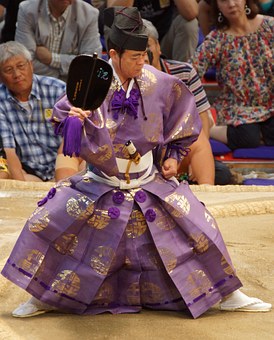「大相撲と武士道」入試によく出る日本文化
このコーナーは国公立大学、難関私大を目指している学生さん向けのコンテンツです。
この記事を読んで目指す大学への一助として下さい。
入試に役立つ日本文化の表現と、文法・語法コーナーです。
貴景勝が大関に昇進しました。
武士道精神で精進、と口上。
本日は、国技である相撲と武士道に関する表現を覚えましょう。
国技、相撲
「相撲は日本の国技です」
Sumo is Japan’s national sport.
・national sport 「国技」
「相撲は元来、単なるスポーツではありませんでした」
Originally, sumo was not just a sport.
・originally 「もともとは」
「相撲の起こりは,1500年前に行われていた豊作を祈るための儀式だといわれています」
Sumo is said to have its origins in a ceremony to pray for a bountiful harvest held 1,500 years ago.
・is said to … 「~と言われている」
・have one’s origins 「~に起源を持つ、始まりは~」
・ceremony 「儀式」
・pray for … 「~を祈る」
・bountiful 「たくさんある、豊富な」
・harvest 「収穫」
「相撲には四十八手といわれる決まり手があるそうです」
They say there are 48 winning techniques in sumo.
・winning techniques 「決まり手」
貴景勝、大関に昇進
「日本相撲協会は、貴景勝の大関昇進を正式に決めた」
The Japan Sumo Association made the official decision to promote to Ozeki, the sport’s second higheset rank.
・the Japan Sumo Association 「日本相撲協会」
・make a official decision 「正式に決める」
・promote 「昇進させる」
「貴景勝は『大関の名に恥じぬよう、武士道精神を重んじ、感謝の気持ちと思いやりを忘れず相撲道に精進してまいります』と口上を述べました」
In his kojo stage speech, Takakeisho said, “In order to live up to the name of ozeki, I will respect the bushido spirit, and be thoughtful and thankful at all times while devoting myself to the way of the sumo.”
・in order to … 「~するために」
・live up to … 「~に恥じない行動をする」
・respect 「重んじる」
・bushido spirit 「武士道精神」
・devote oneself to … 「~に精進する」
・the way of the sumo 「相撲道」
・thoughtful 「思いやりのある」
・thankful 「感謝している」
・at all times 「いつも、常に」
以下の表現も可能です。
「大関の名に恥じぬよう、相撲道に精進してまいります」
I will strive in the art of sumo to maintain the honor of the title of Ozeki.
・strive 「一生懸命になる、務める」
・the art of sumo 「相撲道」
・maintain the honor of the title of … 「~の名に恥じぬよう」
「武士道精神を重んじます」
I will respect the samurai spirit.
「感謝の気持ちと思いやりを忘れません」
I will never forget my feelings of gratitude and being considerate of others.
・gratitude 「感謝」
・being considerate of … 「~の気持ちを考えること」
武士道とは
「武士道は,鎌倉時代から発達し、江戸時代(17世紀から19世紀半ばまで)に儒教的思想に裏付けられて大成した武士階層の道徳体系のことです」
Bushido is the moral code of the samurai class. Based on Confucian ideas, it originated in the Kamakura period and reached perfection in the Edo period (1603-1867).
・moral code 「道徳体系」
・samurai class 「武士階層、階級」
・Confucian ideas 「儒教思想」
・reach perfection 「大成する」
入試によく出る表現、文法・語法
本日の記事中から入試によく出る英語表現や文法・語法です。
下の表で確認し、わからないときは上の本文へ戻り、文の中で確認しましょう。なぜなら文章の中で覚えると忘れにくく、応用できるからです。英語の力がだんだんついていくでしょう。
それでは下記の表をご覧ください。
| 英語 | 日本語 |
|---|---|
| pray for | ~を祈る |
| bountiful | たくさんある、豊富な |
| make a official decision | 正式に決める |
| live up to … | ~に恥じない行動をする |
| respect | 重んじる |
| devote oneself to … | ~に精進する |
| thoughtful | 思いやりのある |
| strive | 一生懸命になる、務める |
| gratitude | 感謝 |
| being considerate of … | ~の気持ちを考えること |
2019年3月29日 TADASHI









